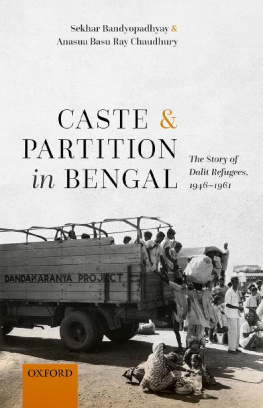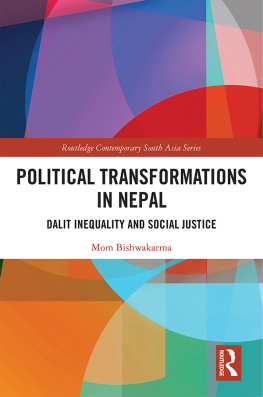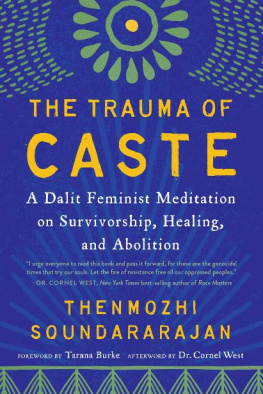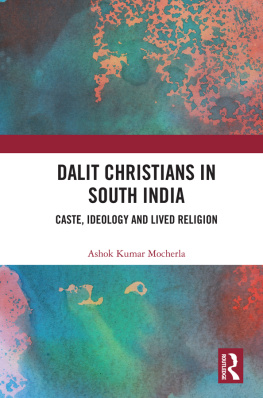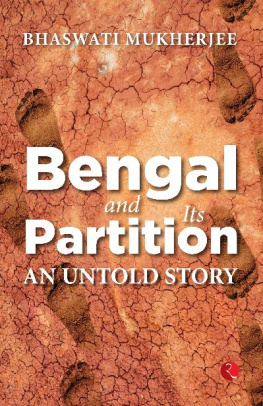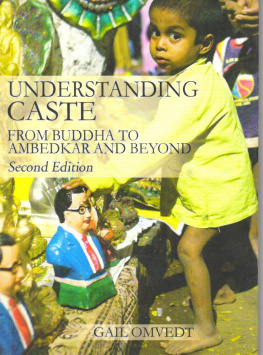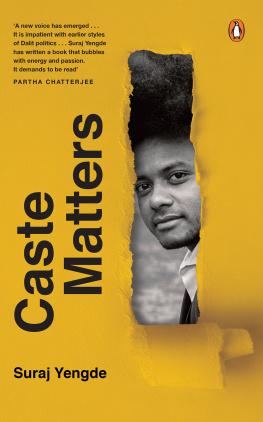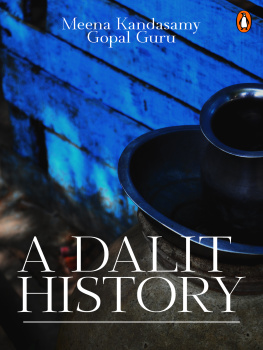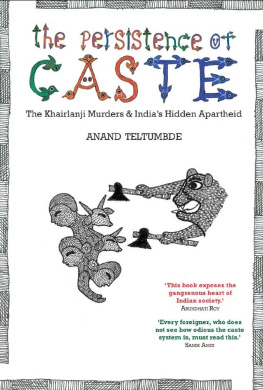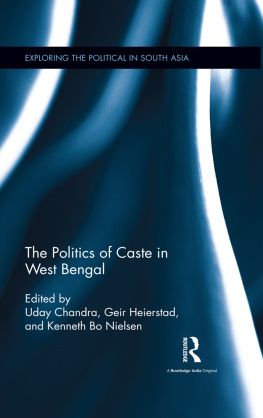Caste and Partition in Bengal
Caste and Partition in Bengal
The Story of Dalit Refugees, 19461961
SEKHAR BANDYOPADHYAY
Emeritus Professor of History, Victoria University of Wellington, New Zealand
and
ANASUA BASU RAY CHAUDHURY
Senior Fellow, Observer Research Foundation, Kolkata
Great Clarendon Street, Oxford, OX2 6DP,
United Kingdom
Oxford University Press is a department of the University of Oxford. It furthers the Universitys objective of excellence in research, scholarship, and education by publishing worldwide. Oxford is a registered trade mark of Oxford University Press in the UK and in certain other countries
Oxford University Press 2022
The moral rights of the authors have been asserted
First Edition published in 2022
Impression: 1
All rights reserved. No part of this publication may be reproduced, stored in a retrieval system, or transmitted, in any form or by any means, without the prior permission in writing of Oxford University Press, or as expressly permitted by law, by licence or under terms agreed with the appropriate reprographics rights organization. Enquiries concerning reproduction outside the scope of the above should be sent to the Rights Department, Oxford University Press, at the address above
You must not circulate this work in any other form and you must impose this same condition on any acquirer
Published in the United States of America by Oxford University Press
198 Madison Avenue, New York, NY 10016, United States of America
British Library Cataloguing in Publication Data
Data available
Library of Congress Control Number: 2022932390
ISBN 9780192859723
eISBN 9780192675828
DOI: 10.1093/oso/9780192859723.001.0001
Links to third party websites are provided by Oxford in good faith and for information only. Oxford disclaims any responsibility for the materials contained in any third party website referenced in this work.
For
the Dalit refugees from East Bengal,
who lost everything due to Partition,
and suffered immeasurably,
due to no fault of their own.
Contents
It is now for almost a decade that we have been doing research for this book, and during this period we have incurred many debts which need to be acknowledged now. First of all, we are thankful to the Royal Society of New Zealand, which by awarding a Marsden Grant in 2011 enabled us to undertake this research. We would like to thank Victoria University of Wellington for providing the necessary research facilities and leave for the principal investigator. We are also thankful to the Mahanirban Calcutta Research Group for offering this project a hub in Kolkata and for providing all the facilities for its associate investigator. Furthermore, we like to thank its former Director Ranabir Samaddar for his advice and guidance at every step of the project.
At different stages of this project, we were given valuable research assistance by a group of wonderful young scholars: Anwesha Sengupta, Hilal Ahmed, Benjamin Kingsbury, Sukla Chakraborty, and Hayden Thorne. We acknowledge their precious input to its final outcome; without their help, it would have been difficult for us to complete it. We have worked in many libraries and archives across the world, like the Victoria University of Wellington Library, National Library, Kolkata; Nehru Memorial Museum and Library, New Delhi; British Library, London; the University of Chicago and University of Cambridge libraries, as well as West Bengal State Archive, Kolkata; and National Archive of India, New Delhi. We thank the staff of all these institutions for their generous help. We are particularly thankful to Swati Sengupta Chatterjee for her valuable assistance in locating materials in IB records in West Bengal State Archives. We are also indebted to Jagadish Chandra Mandal, son of Jogendranath Mandal, for sharing with us some of his stories and perspectives about his father and family and giving us access to some valuable documents in his collection. Furthermore, we take this opportunity to thank Deepak Bhattacharya who helped us get access to the papers of the Department of Refugee, Relief, and Rehabilitation, Government of West Bengal, Kolkata. We would also like to thank Ashok Chakrabarti for introducing us to the residents of Coopers camp and organising some of our meetings with them.
We wish to acknowledge scholars who have worked before us on this themeparticularly Joya Chatterji, Abhijit Dasgupta, Debjani Sengupta, Nilanjana Chatterjee, Haimanti Roy, Dwaipayan Sen, Uditi Sen, and Swati Sengupta Chatterjee. Empirical information and analytical insights from their writings have helped us shape our arguments.
We have presented papers on various aspects of this project at numerous conferences, seminars, and webinars in Australia, India, New Zealand, Norway, Singapore, UK, and USA. We are thankful to all the participants who raised questions, gave constructive comments, and helped us think critically about our arguments. We are also thankful to the two anonymous referees for their comments and suggestions. An earlier version of the first chapter of this book appeared as an article in Studies in History . We are thankful to its editors and publisher for permitting us to reprint it here.
Finally, we wish to thank most sincerely all the former residents of the refugee camps who shared with us their painful memories of those horrible days of displacement and struggle for rehabilitation and gave us the opportunity to tell their stories to the world. It is to them that we dedicate this book.
Sekhar Bandyopadhyay
Victoria University of Wellington
Anasua Basu Ray Chaudhury
Observer Research Foundation, Kolkata
1 June 2021
Wellington/Kolkata
| AICC | All India Congress Committee |
| AISCF | All India Scheduled Castes Federation |
| CA | Constituent Assembly |
| CM | Chief Minister |
| CPI | Communist Party of India |
| CPI(M) | Communist Party of India (Marxist) |
| DDA | Dandakaranya Development Authority |
| EIRC | East India Refugee Council |
| GI | Government of India |
| IB | Intelligence Branch |
| IOR | India Office Records |
| MLA | Member of Legislative Assembly |
| MM | Matua Mahasangha |
| MP | Member of Parliament |
| NAI | National Archive of India |
| NMML | Nehru Memorial Museum and Library |
| PSP | Praja Socialist Party |
| RCPI | Revolutionary Communist Party of India |
| RSP | Revolutionary Socialist Party |
| SBBS | Sara Bangla Bastuhara Sammelan |
| SC | Scheduled Caste |
| UCRC | United Central Refugee Council |
| WBLAP | West Bengal Legislative Assembly Proceedings |
| WBPCC | West Bengal Pradesh Congress Committee |
WBSA | West Bengal State Archive |
Partition and Caste
Caste as an analytical category is seldom introduced into the discussion of Partition of India in 1947. In conventional narratives of Partition, the Muslim League and the Indian National Congress are presented as the two main players, and the Partition-related violence is assumed to be primarily between the Hindus and the Sikhs on one side and the Muslims on the other. All internal differentiations within these groups, based on gender, caste, or region, are collapsed to present the two contending groups as homogenous subcontinental categories representing two distinct social and eventually political identities. If the gender imbalance in this historiography has now been rectified to some extent, but we do not know why they almost completely disappeared after the Partition. Was it because of Partition politics? Then, after the Partition, we witnessed endless streams of refugees coming into West Bengal, and among them were many Dalit peasants. Their different experiences of migration and resettlement remain largely unrecognised. This book seeks to address this discursive absence of the caste question and the Dalit from the long history of Partition in Bengal.



